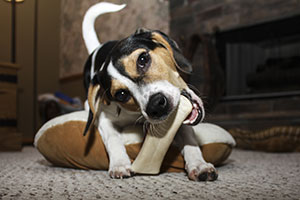February marks National Pet Dental Health Month, a great opportunity to learn how to take better care of your pet’s teeth and gums. Below, Graham Thatcherclinical assistant professor of dentistry and oral surgery at the UW School of Veterinary Medicine, shares his top tips for pet owners. (Editor’s note: Thatcher has since resigned from UW Veterinary Care and the School of Veterinary Medicine.)
Why is dental health important to a pet’s overall health?
The mouth is one of the gateways to all other body systems. Poor oral hygiene and poor oral health have been repeatedly linked to poor health in other organ systems and poor general health in the human and veterinary literature.
Some of the gingival (gum) tissues are unique in that they are inherently ‘leaky’. When they become inflamed, the leakage increases. This becomes an increased means for plaque bacteria to enter the bloodstream and shower other areas of the body with oral bacterial pathogens.
What is the number one thing you wish pet owners knew to help protect their pet’s teeth?

I want all pet owners to understand that their pet’s oral health and disease progression is very similar to their own oral diseases. The recommendation is always for comprehensive oral health evaluations annually with a qualified veterinarian, in addition to daily brushing.
What specific advice can you give about brushing your teeth?
Dogs and cats will tolerate tooth brushing if it is not painful and comes with a reward. I recommend starting with short periods of massaging the gums with your finger and progressing to a soft-bristled toothbrush. The focus should be on the cheek of the teeth, as this is where more plaque accumulates.
If toothpaste is used, I would recommend a pet-specific toothpaste that does not have added fluoride, as pets are likely to ingest some of the paste. Fluoride can reach toxic levels if ingested. Additionally, I would recommend only using products that carry the Veterinary Oral Health Council (VOHC) seal of approval. You can find these products at vohc.org.
Are dental bones and chews or dental wipes effective at cleaning pet teeth?
Bones and dental chews can be effective aids in oral hygiene, however the use of hard objects poses a huge risk. We never recommend giving bones, horns, or bully sticks (dried bull penis) to a pet as chews, as they usually lead to dental fractures that can be painful and expensive to repair.
As a general rule, if you can bend or bend the object, it is less likely to break a tooth. Additionally, if something is too difficult for you to chew, then you should not allow your pet to chew on it.
Dental wipes have been marketed to pets and although there may be some benefit, there is no replacement for regular brushing with a soft-bristled toothbrush.
There are things you would ask pet owners not to do when it comes to caring for their pet’s teeth?

We strongly discourage pet owners from offering hard objects as a supplement to daily tooth brushing and annual professional care, as the risks of tooth fracture are too great. We also discourage pet owners from having dental care without the use of a safe general anesthesia protocol administered and monitored under the supervision of a qualified veterinarian. “No anesthesia” and “light anesthesia” dental procedures are gaining popularity, which plays on the owner’s fears about anesthesia. Anesthesia is absolutely necessary for safe dental scaling and dental procedures.
We also need to take a preventative approach to periodontal or gum disease. Historically, veterinarians have recommended waiting until signs of disease such as swollen and bleeding gums, broken teeth, bad breath, and heavy plaque and tartar are present on conscious oral evaluation. We recommend general anesthesia and intraoral x-rays in addition to skillful prophylactic dental cleanings, even when there are no obvious signs of disease.
If someone is reluctant to pursue a dental cleaning or other dental procedure for their pet, what words of reassurance can you offer?
Veterinary teams regularly present with pet owners who are reluctant to undergo dental procedures, such as comprehensive oral health evaluations, including intraoral x-rays, due to fear of anesthesia, cost, and the possibility of finding pathology that requires treatment. A comparison with the prevention of periodontal disease in the human population is often discussed, as it is natural to lose teeth. The problem is that tooth loss comes with a degree of preventable discomfort and general illness.

We will assure pet owners that a board-certified veterinary anesthesiologist can consult and attend for procedures, including those that carry certain increased risks. Referral of customers to a board certified veterinary dentistsuch as those at UW Veterinary Care, may be warranted not only for serious and unique disease presentations but also for those clients who need additional reassurance as to the safety of the procedure.
Anything else you’d like to share with pet owners?
There are prescription dental diets and other products that have been shown to be beneficial to overall oral health. I highly recommend asking a qualified veterinarian for a conscious oral evaluation at each annual or semi-annual visit.
In addition, safe and effective products that can supplement daily tooth brushing and annual professional dental care can be found at vohc.org. The Veterinary Oral Heath Council has done due diligence to assess the safety and effectiveness of the products listed.
Veterinary dentistry is one of the most rewarding professions. Process success and customer satisfaction is overwhelmingly high. Imagine coming to work every day knowing that you are making a tangible and very positive impact on the well-being of your patients – that’s exactly what we do!

